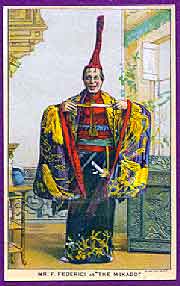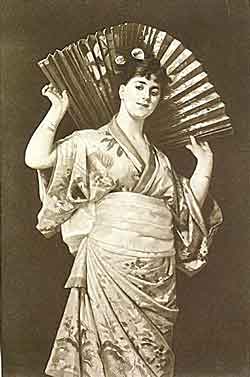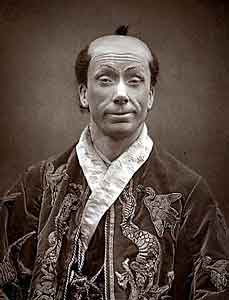Gilbert and Sullivan ArchiveTHE MIKADOIntroduction |
 |
“THE MIKADO, or The Town of Titipu," was produced at the Savoy Theatre on 14 March, 1885 and proved to be one of the most famous of all the Gilbert and Sullivan Operas, running, as it did, for 672 nights.
The plot of "The Mikado", as Mr. Adair Fitzgerald mentions in his book "The Story of the Savoy Opera", came to Gilbert through a Japanese sword, which hung on the walls of his study, suddenly falling down.
Act I opens with a scene of Japanese nobles, richly dressed in flowing silks and each carrying a fan, standing or sitting in the court-yard of Ko-Ko's Palace in Titipu..
Ko-Ko, formerly a cheap tailor, under sentence of death for flirting, was reprieved at the last moment and, on being "taken from the county jail by a set of curious chances", was raised to the exalted rank of Lord High Executioner.
Nanki-Poo, in reality the Mikado's son and in love with Yum-Yum, Ko-Ko's ward, enters disguised as a Second Trombone and sings his beautiful song, "A wand'ring minstrel I—a thing of shreds and patches", and then explains to the assembled nobles that he had hurried back to claim Yum-Yum, who was betrothed to her guardian Ko-Ko, as she would now be free since he understood that Ko-Ko was to be beheaded.
However Pooh-Bah (Lord High Everything Else) and Pish-Tush (a noble lord) point out to Nanki-Poo that not only has Ko-Ko been reprieved but on "this very day from school Yum-Yum will wend her way and homeward come ... to wed the Lord High Executioner!"
Ko-Ko then enters and tells in song how he obtained his exalted position, and in case he should ever be called upon to act professionally he has "got a little list of society offenders who might well be underground".

Soon the beautiful Yum-Yum appears with her two sisters, Peep-Bo and Pitti-Sing, who are also wards of Ko-Ko, and together they sing an enchanting Trio, "Three little maids from school are we", which received a treble encore on the first night and thunderous acclamations ever since.
Naturally Yum-Yum is delighted to see Nanki-Poo, who discloses his identity to her and explains that he fled in disguise from his father's Court in order to avoid the misfortune of having to marry Katisha, an elderly lady who claimed him in marriage.
Later Ko-Ko receives a letter from the Mikado, who is struck by the fact that no executions have taken place in Titipu for a year and decrees that unless somebody is beheaded within one month, the post of Lord High Executioner shall be abolished, and the city reduced to the rank of a village.
Consternation reigns! but after various schemes and victims have been suggested and rejected Nanki-Poo conveniently walks in with a rope in his hands intending to hang himself and so put an end to an unendurable existence since he cannot marry his adored Yum-Yum.
Ko-Ko quickly persuades this heaven-sent victim to give up the idea of suicide and, instead, be beheaded handsomely in a months time at the hands of the Public Executioner; and in return Ko-Ko reluctantly agrees to let Nanki-Poo marry Yum-Yurn the following day as, after all, she will soon be a widow and can then become Ko-Ko's bride.
Yum-Yum and her companions are singing and dancing with Nanki-Poo to celebrate the month-long wedding when the tall, grim Katisha suddenly enters and tries to claim her perjured lover Nanki-Poo, but is told by Pitti-Sing, in a delightfully haunting air, that she is too late, "for he's going to marry Yum-Yum".
Katisha is furious, and tries in vain to tell them all that the disguised Nanki-Poo is in reality the only son of the Mikado, but they drown her voice and will not let her speak; the act closes as Katisha, threatening to wreak vengeance on all who have thwarted her, storms angrily through the crowd on her way to inform the Mikado that his son has been found.

As the curtain rises on act II Yum-Yum is discovered seated at her bridal toilet in Ko-Ko's garden surrounded by her sisters and friends who are dressing her hair and painting her face and lips.
After pointing out to her friends, in her artless Japanese way, how much more attractive she is than anybody else in the whole world, Yum-Yum is joined by Nanki-Poo and they discuss how best to enjoy themselves during the short time of their intended marriage, when Ko-Ko enters and informs them that he himself and Yum-Yum. cannot be married after all. Their sudden joy at this announcement is soon dispelled when he tells them that he has just ascertained that by the Mikado's law, when a married man is beheaded his wife is buried alive.
This alters the position completely for poor Yum-Yum who not unnaturally has no desire to go through with her marriage to Nanki-Poo if at the end of the month she has to suffer such a stuffy death.
This appalling situation leads to one of the most famous songs in the opera and one which is sometimes encored as many as five or six times, the well known Trio, "Here's a howde-do! if I marry you, when your time has come to perish, then the maiden whom you cherish must be slaughtered too!"
Pooh-Bah now enters and warns Ko-Ko that the Mikado and his suite are approaching the city to find out, so it seems, whether his orders have been carried out.
Ko-Ko is distraught at the thought of having to behead anyone, and although Nanki-Poo is quite willing to carry out his part of the bargain and even lowers his head then and there to receive the fatal blow, and although Pooh-Bah encourages the Lord High Executioner with the words, "Chop it off! Ko-Ko. Chop it off!", Ko-Ko refuses to carry out the execution.
But in his extremity he suddenly has a brilliant idea and says to Nanki-Poo, "Why should I kill you when making an affidavit that you've been executed will do just as well?" Pooh-Bah, for a cash down payment, is persuaded to perjure himself and guarantees that all the other High Officers of State (himself) are prepared to do the same and will endorse any tale that Ko-Ko cares to tell.
Yum-Yum is sent for and, to her amazement, is told to go away with Nanki-Poo and get married while the others prepare to receive and, if possible, to hoodwink the Mikado with a lurid description of an imaginary execution.
The Mikado, a tall and rather terrifying figure, enters with Katisha, his daughter-in-law elect, and tells in his well-known song how he deals with tiresome society sinners, and makes "each prisoner pent unwillingly represent a source of innocent merriment".
When he has finished Pooh-Bah, Ko-Ko and Pitti-Sing enter, Ko-Ko handing the Coroner's Certificate to the Mikado. In their Trio, "The criminal cried, as he dropped him down, in a state of wild alarm", they describe how the execution took place, each one trying to outdo the other in praising themselves for the part they had played in it.
Although interested in their story the Mikado informs them that he came about a totally different matter. He had come in search of his son who, disguised as a Second Trombone, was thought to be hiding in the city under the name of Nanki Poo. Ko-Ko, Pooh-Bah and Pitti-Sing are astounded to hear that Nanki-Poo is the Mikado's son and, when asked to produce him, Ko-Ko pretends that he has gone abroad but Katisha, who is reading the faked certificate of death, suddenly cries out in horror when she sees that Nanki-Poo was beheaded that very morning.
The three accomplices fall on their knees and beg for mercy, but the Mikado informs them that for "compassing the death of the Heir Apparent" the punishment is death—"something lingering, with boiling oil in it", and arranges to have the ceremony postponed until after luncheon.
While discussing their predicament Nanki-Poo returns with Yum-Yum, whom he has just married, and tells Ko-Ko that he dare not reappear while Katisha is single, but if Ko-Ko would marry her all would be well.
Ko-Ko is appalled at the suggestion but realizes that it is the only way to save himself and his friends from the "boiling oil" episode that is awaiting them, and so he reluctantly proposes to Katisha who at first spurns him as the miscreant who had robbed her of her love, but after some persuasion she changes her mind and gratefully accepts him.
When the Mikado returns from lunch he is surprised to learn that Katisha has already married Ko-Ko, and when Nanki-Poo walks on with Yum-Yum the Mikado gladly accedes to their prayers for mercy. Katisha not unnaturally feels that she has been deceived as Nanki-Poo escaped her matrimonial wiles but she consoles herself with being the wife of the Lord High Executioner and all ends happily.
In the Mikado the fan plays an important part, for all the characters are continually opening and closing them. On the first night, and in fact ever since then, the actors fluttered them so naturally it seemed as if they had been born with fans in their hands.
At the time the opera was produced there was a small colony of Japanese men and women living in an imitation village at Knightsbridge. Hence Ko-Ko's somewhat unexpected reply to the Mikado when asked the whereabouts of Nanki-Poo.
"It's rather awkward, but, in point of fact, he's gone abroad!"
"Gone abroad?" exclaims the Mikado, "His address."
"Knightsbridge!" answers Ko-Ko.
When the company is on tour Ko-Ko usually substitutes a local name in place of Knightsbridge; but this particular case has the Author's permission, for in no other instance would Gilbert allow any gagging.
With his usual eye for detail Gilbert took some of these Japanese people to the Theatre in order to show the actors how to manipulate their fans and how to shuffle along in that curious oriental fashion which to a European appears to be half run and half walk.
With regard to Sullivan's work on "The Mikado" it is strange to note that he almost always put off the composing of each new opera until the very last moment.
The Mikado was to be produced on the night of 14 March, and yet Sullivan had reached only the Finale of Act I on the evening of 3 March, for on that date he wrote in his diary:
"Worked all night at Finale 1st Act. Finished at 5 a.m. 63 pages of score at one sitting!"
 Evidently he was highly satisfied with the opera's reception for to quote once again from his diary for 14 March he writes:
Evidently he was highly satisfied with the opera's reception for to quote once again from his diary for 14 March he writes:
"New opera 'The Mikado, or the Town of Titipu' produced at the Savoy Theatre with every sign of success. A most brilliant house. Tremendous reception. All went very well except Grossmith, whose nervousness nearly upset the piece. A treble encore for 'Three Little Maids' and for 'The flowers that bloom in the spring'. Seven encores taken—might have taken twelve".
Grossmith at that time was unfortunately not physically fit and was somewhat prostrated too through long and numerous rehearsals. In his book 'A Society Clown" he refers to the first night of "The Mikado" and says, "I lost my voice, the little there is of it, my confidence, and—what I maintain is most valuable to me—my own individuality."
However, the first night once over, Grossmith soon became a very good Ko-Ko indeed.
The Opera was so successful in England that Carte produced it in New York with very good results; also in Philadelphia and all over the States.
It was produced too in Australia, Berlin and Holland and three companies toured England.
- To Top of Page
- To Notes on The Mikado
- To Mikado Web Opera Home Page
- To Mikado Home Page
- To Gilbert and Sullivan Archive Home Page.